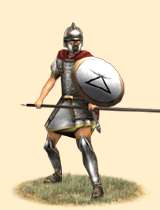'Hanatim Alupim (Elite African Pikemen)
 |
Weapons | Defence | Mental | ||||||
|---|---|---|---|---|---|---|---|---|---|
| Primary | Secondary | Armour: | 12 | Morale: | 15 | ||||
| Type: | spear | sword | Shield: | 5 | Discipline: | disciplined | |||
| Attack: | 18 | 10 | Skill: | 7 | Training: | highly_trained | |||
| Charge: | 0 | 4 | Recruitment | Other | |||||
| Lethality: | 0.17 | 0.13 | Soldiers: | 60 | Hit Points: | 1 | |||
| Range: | 0 | 0 | Cost: | 2936 | Mass: | 1.45 | |||
| Ammo: | 0 | 0 | Upkeep: | 734 | |||||
| Turns: | 1 | ||||||||

The Elite African Pikemen are the elite veterans chosen from all of the ranks of Carthaginian Infantry. They are hand-picked and trained in the Macedonian-style phalanx tactics to create elite phalangites.
Superior
Disciplined
The Elite African Pikemen are two things: an elite infantry of picked men and a reply to the Successor's tactics. Although recruited from the Carthaginian population to be part of their infantry, these men are the ones that distinguished themselves in battle in many occasions. As very experienced and prized veterans, they are supported by the state, and as such, have extremely good equipment. Like most of the Successor's battle line, they fight as Macedonian-style phalangites wielding the long sarissae. They are a nearly impervious wall from the front, and, although like any phalangite unit, vulnerable from the sides or back, can hold their own in closer combat due to their proficiency with swords. Even the heaviest cavalry is no match for the Elite African Pikemen as long as they’re presenting their spears in the direction of their attacker. Only a flanking maneuver by heavy cavalry or heavy infantry has a chance of breaking them in a melee.
Historically, together with the famed Elite African Infantry, these men were used to great effect in many important battles. Their imperviousness, esprit de corps and élan secured many times the Carthaginian line. Their rareness did not allow them to distinguish themselves in more situations against the Roman opponent. Had they been trained in greater quantities and used in a more frequent and supported role, history would, perhaps, say otherwise. In any event, they were deserving of the moniker that Livy gave to their brethren: ‘The flower of the Carthaginian army’.